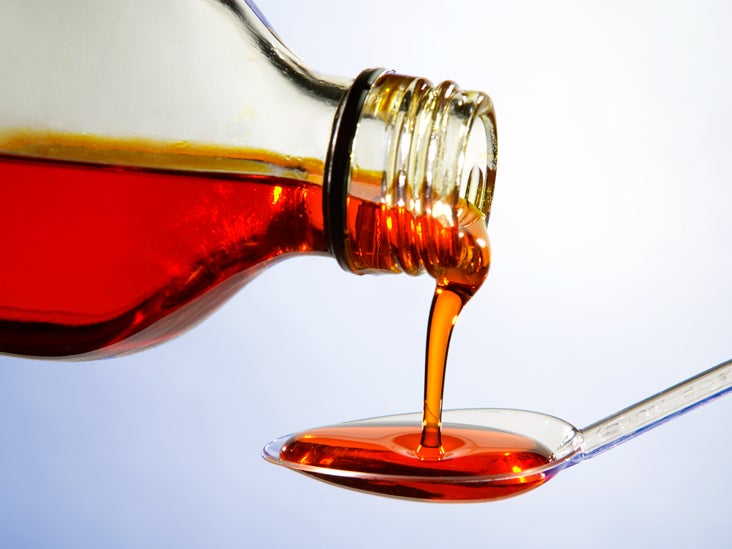Cough medicine for kids: Types and alternatives - Medical News Today

There is little evidence that cough medicines work better than home remedies at easing a child's cough. Most of the time, unless a cough is causing distress or disturbing sleep, there is no need to treat it.
Children's coughs usually resolve on their own after a couple of weeks. Cough medicines do not clear a cough but may make a child feel more comfortable.
This article outlines current advice on treating children's coughs and home remedies that might be safer and more effective in making a coughing child feel more comfortable.
There is usually no need to treat a child's cough with medication. According to the American Academy of Allergy Asthma and Immunology (AAAAI), coughing helps a child remove mucus, infections, and irritants from their respiratory tract.
The AAAAI also states that most over-the-counter (OTC) cough medicines are not particularly effective. However, if a child's cough is causing distress or disturbing their sleep, caregivers may want to consult their doctor about giving them OTC medication.
The
As a result, according to a
In addition, the FDA suggests that all medications for children come with specialized dosing equipment as giving too much to a child can be dangerous.
There are currently no FDA-approved homeopathic products. Any homeopathic products sold in the United States have not met the FDA's requirements for safety and effectiveness.
Different types of cough and cold medications work differently:
- nasal decongestants unclog a stuffy nose to make breathing easier
- expectorants loosen mucus in the lungs so a person can cough it up
- cough suppressants reduce the frequency of coughing
- antihistamines stop sneezing and a runny nose
- pain relievers ease headaches, aches, pains, and fever
A
If a person wants to give a child cough medicine, they can choose one with dextromethorphan (DM), which is present in most nonprescription cough syrups.
The most common cause of cough in children is the common cold. According to the Centers for Disease Control and Prevention (CDC), adults have an average of
Other causes of a cough in children include:
- Air pollution: Fumes from cars or tobacco smoke can cause a child to develop a cough.
- Allergies: Allergens such as pollen or pet dander can cause allergy coughs. Allergy medications can help control these types of cough.
- Asthma: One of the most common causes of chronic cough in children is asthma.
- Exercise: This can trigger a cough, especially if the air is cold or polluted.
- Sinus infections: Pressure within the sinus may trigger a cough.
Some serious causes of coughs in children include bronchiolitis, pneumonia, whooping cough, or having a foreign object stuck in the airway.
Read more about dry cough in children here.
Most coughs last up to 2 weeks if a viral infection is the cause. Caregivers can help ease the symptoms of a cough and help a child feel more comfortable using home remedies. These include:
Fluids
Caregivers should ensure that the child drinks plenty of clear fluids while they have a cough. Warm drinks can help soothe a sore throat. Always ensure that the liquid is cool enough for the child to drink and in a suitable child-safe bottle or cup.
Menthol rubs
Children over 2 years might benefit from menthol rubs to soothe cough symptoms. Menthol
Humidifiers
People can use a cool-mist humidifier to make breathing easier. Keeping the airways moist can help make it easier to cough up congestion. The FDA recommends
Humidifiers or vaporizers that use hot water are not recommended due to the risk of burns if they tip over.
Honey
For children over the age of 12 months, honey can help improve the severity and frequency of cough. Use half to 1 teaspoon of honey up to 4 times per day, either straight from a spoon or dissolved in warm water.
Caregivers should not give honey to children under 12 months as there is a risk that they may develop a condition called infant botulism.
Saline nose drops or sprays
Saline nose drops or sprays are suitable
Learn about safe home remedies for toddler cough here.
If a child displays the following symptoms, a caregiver should contact a doctor right away:
- a fever of over 104°F (40°C)
- coughing up blood
- nonstop coughing
- severe chest pain
- the skin between their ribs pulling in as they breathe
- bluish lips or face while coughing
- trouble breathing when not coughing
- wheezing or a harsh sound when breathing
According to the CDC, people should also call the doctor if the child:
- has symptoms that last
more than 10 days - is younger than 3 months with a fever or lethargy
- has symptoms that are severe or unusual
Most people will recover from cough within 7–10 days. People with underlying conditions such as asthma, respiratory conditions, or a weakened immune system may develop complications such as pneumonia.
Therefore, if a child does not get better within 7–10 days or if they begin to worsen, caregivers should take them to their pediatrician for further investigation.
There are many different types of cough medication available, but there is little evidence that they are more effective than home remedies at easing cough symptoms. OTC medications may cause unwanted side effects that outweigh any benefits.
Most coughs improve after 2 weeks without medication. Home remedies that can ease cough symptoms include drinking lots of fluids, including warm drinks, and using a cool-mist humidifier.
If symptoms worsen or a child has a persistent fever, pain, and difficulty breathing, they should receive medical attention.


Comments
Post a Comment